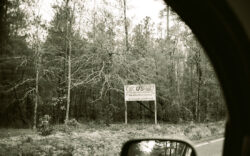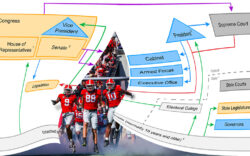We came to work one morning several years ago at the old Flagpole office on Foundry Street and found a dazed and bloody chicken on the doorstep with a note around its neck saying something to the effect of “Help me.” There wasn’t much we could do to help it, but we did take it over to the vet school, where they said it was too far gone and killed it with more mercy than it would have got at “The Poultry,” if it hadn’t escaped the truck.
We see them rattling past in the little cages on the big trucks bound for the processing plant over near the bypass. Fortunately for us devotees of chicken salad, we don’t see them up close. I saw this one up close, and it was not chicken salad, it was a chicken or a manufactured facsimile of a chicken with just enough life left in it to remind me that from birth to death this thing’s short life was spent in confinement, and its only reason for existing in God’s universe was to turn itself into nuggets and tenders and drumsticks and salad for our enjoyment.
If you live around here, you have frequently noticed out in the surrounding countryside, especially north of here, chicken houses in fields where crops used to grow. You may have noticed, too, over time, that the chicken houses have grown considerably in size and in sophistication, so that the modern ones look like little factory farms and the older ones are pretty much abandoned.
If you’re near my age bracket, you grew up hearing on television the jingle, “Jesse Jewel Southern fried chicken; Jesse Jewel, sure is great…” On the way to Gainesville on 129 just past I-85, you passed the Jesse Jewel processing plant and had to hold your breath, since your car was not air-conditioned, the same way we have to hold our breath around here sometimes, thanks to our own processing plant.
But we don’t mind holding our breath, because we know how much chickens add to our economy as well as our diet. Our chicken plant provides jobs for those who need them the most, and all those chicken houses have saved family farms that otherwise would have gone out of existence.
Well, not so fast: Those chicken houses are not what they appear to be. The University of Georgia Press recently published Monica R. Gisolfi’s The Takeover: Chicken Farming and the Roots of American Agribusiness. We already knew that agribusiness—giant, corporate control of farming—has taken over our food chain, but Ms. Gisolfi succinctly lays out for us just how this came about right here in North Georgia, right before our uncomprehending eyes. A lot has been written, not that we’ve read it, about the evolution of corporate farming, and Ms. Gisolfi, an associate professor of history at the University of North Carolina, Wilmington, provides copious citations to that literature in her notes.
Remember the song lyric, “I owe my soul to the company store?” That came out of cotton tenant farming, in which the landlord, through his store, advanced goods to the farmer during the growing season and then settled up when the crop came in, usually taking all the farmer made.
Lo and behold, as cotton wore itself out in North Georgia before and after World War II, chicken farming arose to take its place, using the same economic model. Jesse Jewel and them (now Tyson Foods, above all others) perfected a vertical integration of the business so that the company owns everything—everything except the means of production. Jewel and Tyson figured out long ago that the actual growing of chickens is not profitable and not worth the investment in land, buildings and equipment, so they left that to the farmers. But Tyson and them control absolutely every other aspect of the chicken-farming process, making the money and letting the farmers take the risk, usually owing their souls to the bank to pay for the upgrades in facilities and equipment demanded by their suppliers, who can drop them if they don’t comply and leave them with no income to meet their bank payments.
The Takeover shows how agribusiness profited from government and university programs meant to help the farmers. And it shows how seamlessly farmers around here segued from cotton tenant farming to chicken tenant farming on the land we pass by in air-conditioned comfort, perhaps munching nuggets as we go.
Like what you just read? Support Flagpole by making a donation today. Every dollar you give helps fund our ongoing mission to provide Athens with quality, independent journalism.










